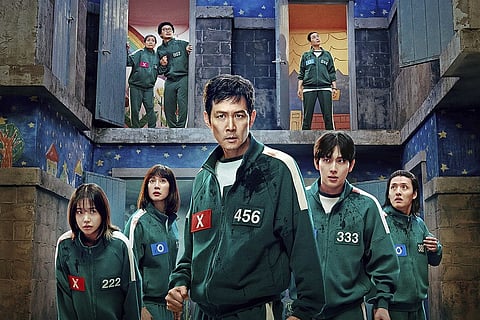How Squid Game 3 set fire to its legacy with clumsy plots and a senseless finale that rivals Game of Thrones 8
Squid Game 3 falters with weak plot and unconvincing characters

It sounds trite, but after watching Squid Game 3, the age-old Batman quote comes to mind. You either die a hero or live long enough to see yourself become the villain.
Squid Game should have ended on its heroic high with Season 1, brilliant, even in its flaws, for its bleak, dystopian lens on humanity and the desperation to claw out of debt, both emotional and financial. Instead, it slogged forward into a meandering Season 2 filled with contrived characters—and the few interesting ones barely got fleshed out.
Still, there was hope that Season 3 would give us answers.
Well, it didn’t. The main antagonist of Season 3, was the plot itself. The storytelling crumbled under the weight of its own expectations and fame, without even a hint of a satisfactory conclusion.
The setup is thin: Gi-hun (Lee Jung-jae) is gaunt, silent, and spiraling after the fallout of his terrible choices—something even 'coward' Dae-ho (Kang Na-heul) calls out. The games continue, bloodier than ever, including a gruesome hide-and-seek. Then, just to muddy things further, a baby is delivered mid-chaos. Season 3 leans heavily into a motherhood arc, ranging from an old woman making a painful decision about her son who’s embraced darkness, to a new mother who tells the child’s father, with perfect clarity, that he’s “trash.”
The CGI baby is meant to symbolise the loss of humanity in the face of greed—but what we actually get is a mawkishly manipulative swirl of clichés: Noble mothers, emotional sacrifice, and a final death-match to protect a child from men who’ve turned into monsters. Beyond a few startled gasps, Squid Game 3 seems more interested in forcing you to cry—and you really don’t want to.
But the truth is, beyond the incessant violence and the clumsily written baby subplot, it’s the lack of compelling, taut storytelling and characters that seals Squid Game’s fate. It’s hard to not return to Season 1 and remember the tragedy of Anupam Tripathi’s Ali, and the three complex finalists—each so distinct and yet so powerful with their backstories. Instead, in Season 3, we get a lineup of irritating finalists we couldn’t care less about—they’re straight-up villains. The few genuinely interesting characters who deserved more are swiftly killed off.
They want money, and the one person Minsu—who could have been more interesting, owing to his guilt, barely gets much due. Im Si-wan’s Myungee turns into a plain unlikeable generic character. Let's not even get started on the VIP's, who seem like straight-up AI that it's almost embarrassing to watch.
What’s worse, the Front Man, played brilliantly by Lee Byung-hun, is barely present this season. Despite having spent Season 2 among the participants, even forming bonds with them, he only appears in the final episode, where a few scraps of backstory are revealed. But it’s nowhere near enough.
The Front Man had always been one of those complicated, subtle characters in the story, from the start itself. Yet, it’s as if the third season had been written by someone who had never watched the show, and hade crafted it based on hearsay. The confrontation between Gi-hun and In-ho, the Front Man, deserved far more tension, more dialogue and fire. But it was rushed through, in a rather Game of Thrones Season 8-esque way, that deserved all the criticism it got and still receives, owing to the fact that everything from character development to plotlines were speeded up infinitely, giving us a finale that no one wants to remember.
And in Squid Game, there’s no payoff to the sibling story between Jun-ho (Wi Ha-Joon) and In-ho, either, Jun-ho finally finds the island and has the same question for his brother that he had in Season 1. Why, he says. We have the same question, Jun-ho. Let us know too.
Moreover, the final game isn’t really a game at all, once again burning down its own story by centering on children’s games. It becomes exhausting with added melodrama, and Gi-hun’s final, potentially impactful words fall completely flat.
With such stellar actors, it feels like a waste. And the final moments make it clear—this isn’t the end; more is coming. But it won’t be in Korean.
Do we really need that?
Sign up for the Daily Briefing
Get the latest news and updates straight to your inbox



